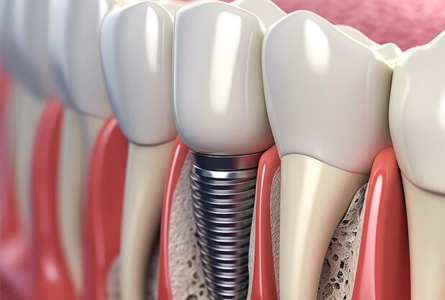Smile Confidently with Dental Implants in Simpsonville, SC

Consider All the
Benefits of Dental Implants
While traditional fixed bridges and dentures are effective solutions for replacing missing teeth, dental implants have several advantages:
- Dental implants closely replicate the look, feel, and function of natural teeth.
- With proper placement, oral hygiene, and regular care, dental implants can last for many years.
- Dental implants stimulate the underlying bone, preventing bone loss and preserving natural facial contours.
- Unlike removable dentures, implants behave like natural teeth and do not slip or dislodge while speaking or eating.
- Dental implants allow for easy speaking, eating, and tasting all types of food without restrictions.
- Dental implants do not decay and are not susceptible to cavities.
- Unlike fixed bridges, dental implants do not require any preparation or crowning of adjacent teeth.
Choose dental implants for a natural-looking and long-lasting solution to missing teeth.
Types of Dental Implants
Single-Tooth Implant
A traditional fixed bridge typically requires the preparation and crowning of teeth on both sides of the empty space in the mouth. These crowned teeth provide support for the artificial teeth, known as "pontics," that fill the gap. Similar to a bridge over water relying on strong pillars at each end, a dental bridge gains strength and stability from the crowned teeth fused to one or more pontics.
In contrast, a cantilever fixed bridge, while similar to a traditional fixed bridge, differs in one crucial aspect. Only one side of the pontic is attached to a crown for support.
Implant-Supported Fixed Bridges
Full Arch Replacement with Four or Six Implants
Implant-Retained Denture
Are Dental Implants Right for Me?
How Are Dental Implants Placed?
Planning and executing every step of dental care is crucial, from initial treatment planning to the precise placement of dental implants and the creation and insertion of final crowns, bridges, or dentures.
Dental implant surgery is typically a minor outpatient procedure, but the extent of the procedure depends on the type and number of implants and any additional preparations needed for the supporting bone.
We prioritize communication as an essential part of patient care. Before your dental implant procedure, we will discuss dental anesthesia, sedation options, and provide detailed pre- and post-operative care instructions. Our office will keep you well-informed throughout the entire process.
After a dental implant is placed, it takes a few months to fully integrate with the surrounding bone. While some implant solutions allow for the placement of a temporary dental crown or bridge on the same day, others require waiting for complete healing and fusion with the surrounding bone before placing permanent prostheses.

